
Humanitarian and Development
Place
Danet region, Niger
Sponsor
Michèle Payraudeau
Grant
20,000 euro to the Selection Committee at 2006/10/03
Project leader
Anigourane
“By providing the populations with water throughout the year, this obviously means guaranteeing their food safety. Beyond this, however, the aim of the project is also to create a cooperative to enable the inhabitants of this village to organize and manage their production. In short, to acquire a new self-sufficiency.”
Michèle Payraudeau
The economy of Niger is based primarily on agriculture. In this arid country, where the temperature can be as high as 50°C, however, water is rare and the aquifers are sometimes located at extreme depths, making drilling costly and reliance on irrigation extremely limited (less than 2% of arable land). The consequences of this situation are well known: years in which the rainfall is completely inadequate, the populations, mostly livestock breeders, suffer terribly from the lack of water, together with their herds. Famines are unfortunately frequent.
To alleviate the food insecurity of the shepherds of the Danet region, northeast of Agadez, the Niger NGO Anigourane fights to provide them with access to water, throughout the year. By drilling wells 100 to 200 meters deep, the idea being not only to guarantee the necessary water supply for the men and their animals, but also to permit the creation of truck gardening zones.
Toward village self-sufficiency
Four villages are finally concerned by the project: Téchillé (600 families), Abalachiwat (400 families), Takarach (280 families) and Fichat (200 families). Initially, however, efforts are concentrated on Téchillé, which serves as a test site before extending the experiment. Thanks to the combined action of many players (the regional Water Board of the Agadez region, the association Robin des Bois, the drilling company Foraco and a hydrogeologist from Cogema for technical assistance), a first borehole was drilled, yielding a flow of 20m3/h and absolutely conclusive. With the help of fondation Veolia and the advice of the specialists of Veoliaforce, it will now have to be equipped with a submersible pump. The aim being to supply a 20m3 tank regularly to provide the precious resource permanently.
Truck gardening activity can then be undertaken to perform several roles: it will provide for the food safety of the families, procure jobs for a number of gardeners, and mean additional income for the women, in charge of managing the water in the future cooperative of the group. An essential organization on the way to self-sufficient development of the village.

